Avail Review: Flexible Modular Blockchain Platform With Outstanding Features
Avail is a project focused on developing infrastructure to solve the Data Availability problem with the goal of overcoming the limitations of traditional blockchain platforms such as Bitcoin or Ethereum. Today, let’s learn details about this project with Coincu through the Avail Review article.
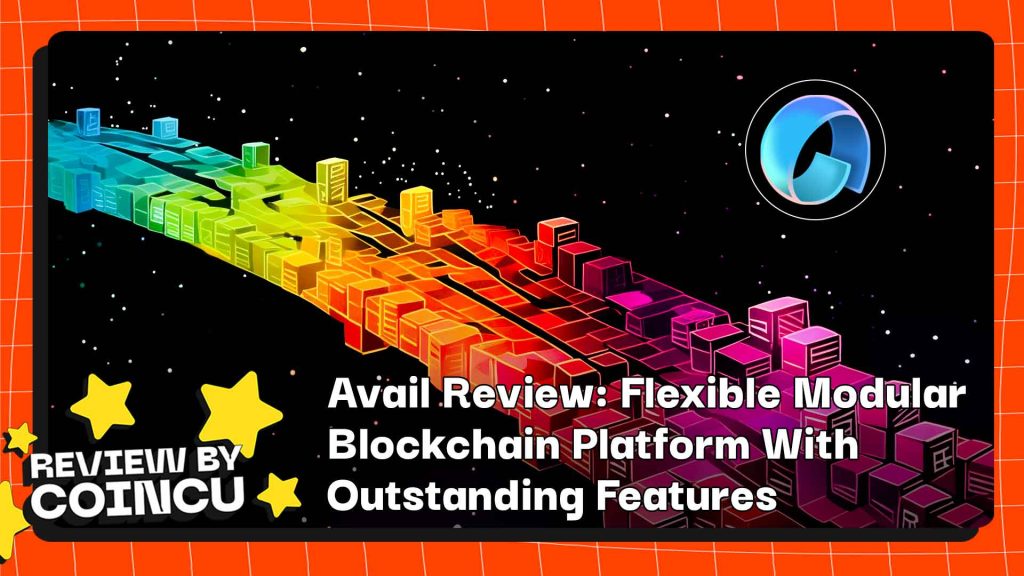
Read more: Centrifuge Review: The First Project to Bring Real World Assets to Blockchain
What is Avail?
Avail is a modular project with a distinctive goal: overcoming the limitations of traditional platforms like Bitcoin and Ethereum. At its core, Avail addresses the challenge of Data Availability, a critical issue faced by both Layer 1 and Layer 2 blockchains. The project introduces a revolutionary infrastructure that allows seamless integration with the Avail network, offering support and compatibility with Layer 2 Rollup solutions.
Avail’s prowess lies in its role as a powerful base layer, specifically tailored for projects extending Validium and Sovereign Rollups. What sets Avail apart is its groundbreaking security approach, which enables Light Client Nodes to effortlessly verify data availability. This security innovation empowers the Avail network, accommodating up to 1,000 validators.
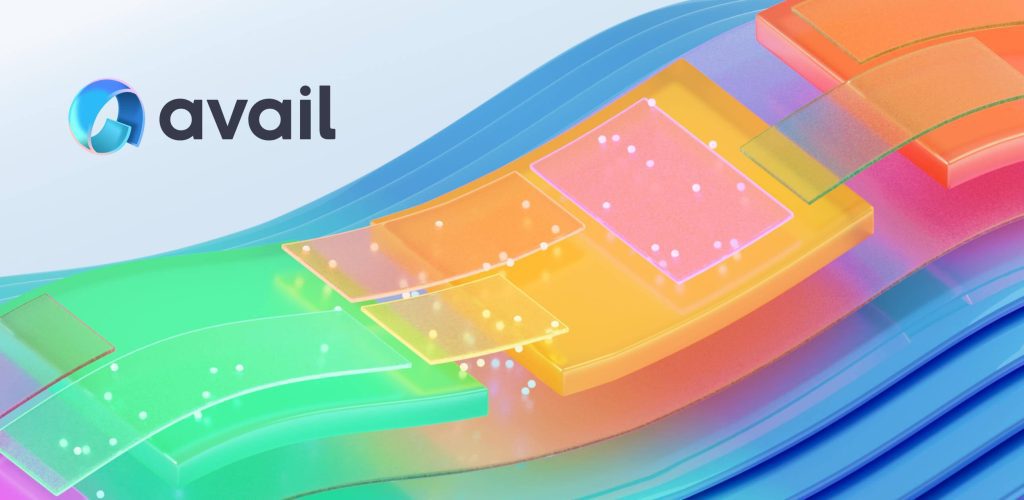
A key advantage of Avail‘s modular approach is the simplification of blockchain integration for developers. The traditional concerns about validators and token systems are alleviated, allowing developers to focus on building applications without unnecessary complexities.
With an exceptional data availability interface and robust security capabilities, Avail facilitates the creation of Fraud Proof or Zero-Knowledge Based Blockchain applications with heightened efficiency. Developers can harness the full potential of Avail’s modular architecture, bringing innovation to the forefront of blockchain development.
Avail is currently in beta testing on the testnet and will deploy the mainnet in the near future. The project established the Avail Foundation, a non-profit organization that helps the community manage the network more effectively.
Highlights of the Avail
Strong security
A standout feature of Avail is its robust security approach, notably seen in the Light Client Node’s ability to seamlessly verify data availability. This key aspect enables the Avail network to scale efficiently with up to 1,000 validators, ensuring a heightened level of safety and reliability in the verification of data availability.
Data Attestation Bridge
Beyond enhancing security, Avail has introduced the Data Attestation Bridge, a novel supply solution tailored to reduce costs for Layer 2 and Layer 3 chains within the Ethereum ecosystem. This strategic move aligns with the project’s commitment to fostering accessibility and sustainability in the rapidly evolving blockchain landscape.
Currently in the testnet phase, the Data Attestation Bridge plays a pivotal role in securing off-chain data. Functioning as a crucial link, it is seamlessly connected to Ethereum, providing a versatile solution for both lay and optimistic organizations utilizing Ethereum as their base layer. This bridge is poised to usher in a new era of efficiency and security, addressing the evolving needs of blockchain users.
Cost Reduction for L2 Solutions
The primary challenge faced by L2 solutions has been the prohibitive cost of data availability, limiting their scalability and economic feasibility. Avail has tackled this issue head-on by introducing a bridge that establishes a direct connection between L2 and L1 aggregate data through its off-chain data availability layer.
By leveraging Avail, L2 rollups can seamlessly transition into Validium and Optimistic chains, significantly reducing data availability costs. This shift not only makes L2 solutions more attractive to developers and users but also enhances scalability by eliminating the need for on-chain data availability.
Economic Viability for L3 Solutions
Avail’s Data Attestation Bridge offers a game-changing solution for L3 compilations, enabling them to convert to L3 Validiums. Under this new approach, L3 syntheses no longer need to send both proofs and data to their L2.
Instead, they can post data directly to Avail and forward only the evidence to L2. This streamlined data flow dramatically reduces the operating costs of L3 solutions, making them more economically viable in the blockchain ecosystem.
High Efficiency in Bridge Implementations
Avail’s bridge implementations operate under an Optimistic security model, prioritizing efficiency without compromising on security. This approach accelerates data verification by only requiring full verification of attestations in the event of a dispute. Importantly, this optimism does not compromise Avail’s functionality or security. The bridge assumes data attestations are valid until challenged, while Avail ensures data availability through proofs of validity without making assumptions about data execution accuracy.
Furthermore, the Avail team is actively working on a Data Attestation Bridge based on zk-SNARK, intending to replace the Optimistic bridge. Despite this transition, the bridge’s contract interface across Ethereum and other EVM chains will remain consistent. This ensures backward compatibility for L2 developers, who can start using the bridge across networks today without worrying about potential interface changes.
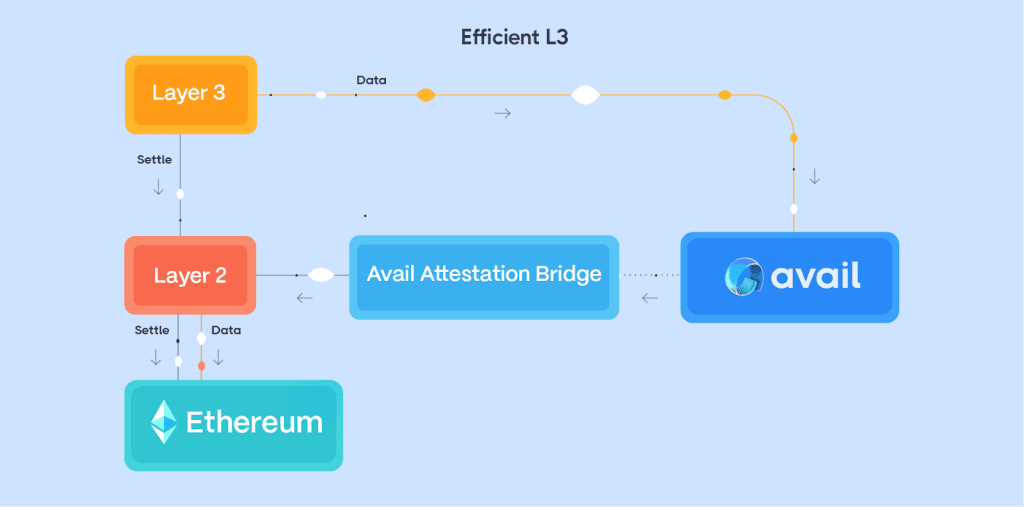
Avail products
As Avail steps into the testing grounds, the Data Attestation Bridge takes center stage. This pioneering bridge plays a crucial role in establishing connections with any Ethereum Virtual Machine (EVM)-compatible blockchain, facilitating seamless integration and linking of diverse blockchain solutions.
Currently deployed on the Kate Testnet, the Data Attestation Bridge introduces the innovative Validium mode. This mode, designed to move transaction data off-chain, presents a groundbreaking approach to cost reduction when compared to traditional Rollup solutions. By shifting transaction data off-chain, Avail significantly lowers costs, enhancing the economic viability of blockchain solutions.
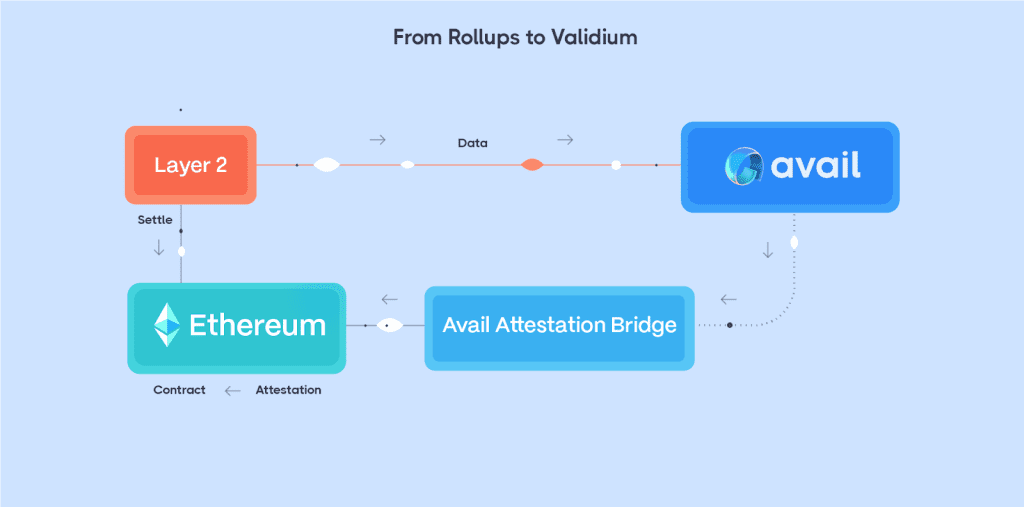
A key feature of the Data Attestation Bridge is its empowerment of developers. Avail provides developers with the tools and capabilities to efficiently create custom authentication solutions, utilizing Avail as a secure repository for their transaction data.
Avail features
Avail introduces several groundbreaking features aimed at enhancing flexibility, scalability, security, and interoperability:
- Modular Design for Unprecedented Flexibility
- Data Availability Layer for Enhanced Scalability
- Scalability Achieved Through Sharding and Proof of Stake
- Security and Privacy at the Core
- Interoperability Driving Seamless Communication
Avail embraces a modular design, breaking away from the traditional monolithic structure of blockchains. This innovative approach involves distinct components that can be easily interchanged or updated.
Developers now have the liberty to cherry-pick components that align with their project needs, facilitating seamless customization. This design not only fosters adaptability to new developments but also empowers developers to tailor the blockchain to their unique requirements.
A pivotal aspect of Avail’s architecture is its robust data availability layer. This layer is meticulously crafted to record and maintain data within the blockchain. Its primary function is to ensure scalability, effortlessly managing multiple transactions.
Avail’s data availability layer guarantees that all data stemming from successfully completed transactions is recorded and readily accessible, contributing to a streamlined and efficient blockchain experience.
Avail’s commitment to scalability is realized through cutting-edge technologies such as sharding and a Proof of Stake consensus mechanism.
These advancements allow Avail to accommodate a growing user base and an increasing number of transactions. Sharding divides the workload, distributing it across the network, while Proof of Stake ensures a secure and energy-efficient consensus mechanism.
Avail places paramount importance on security and privacy within its framework. Users can trust that their data remains secure, and transactions are trustworthy. This is achieved through a comprehensive strategy encompassing cryptography, decentralization, and precise control over data access.
Avail ensures that only authorized individuals can access sensitive information, preserving the confidentiality of user data. Moreover, Avail supports private transactions, offering users the autonomy to keep their data private if desired.
Avail takes a significant step towards blockchain interoperability by providing robust tools and protocols. These facilitate effortless communication between disparate blockchain networks and systems, enabling cross-chain transactions and data sharing. This interoperability feature positions Avail as a key player in fostering collaboration and connectivity across the broader blockchain ecosystem.
What is Data Availability Problem?
The term “data availability problem” is a critical challenge that demands attention. This predicament revolves around ensuring that all nodes within the network can verify the publication of complete data when a new block is generated.
The core idea behind the data availability problem is to establish a mechanism where nodes can be confident that every piece of information within a block has been successfully disseminated across the network.
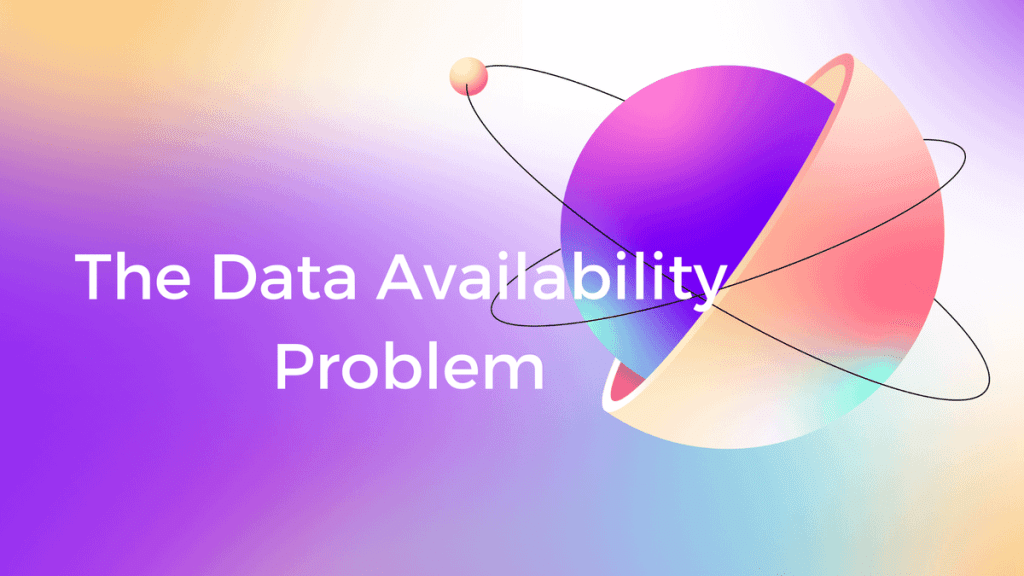
At its essence, the issue arises when a block producer fails to release all the data encapsulated within a block. Without complete data visibility, it becomes impossible for the network to ascertain the presence of any concealed malevolent transactions. This poses a serious threat to the security and transparency that are fundamental to blockchain technology.
Efforts are underway to devise effective solutions to the data availability problem. Blockchain experts and developers are exploring innovative approaches to ensure that every node within the network can reliably confirm the dissemination of complete data for each new block.
Avail’s working mechanism
Avail’s mission is to enhance the scalability of blockchains within and beyond the Polygon ecosystem. Inspired by the efficiency of Blob Storage in Web 2, Avail employs a similar architecture for optimal storage of large amounts of unstructured data.
Blob Storage, known for its scalability and cost-effectiveness, utilizes a binary large object (blob) structure, enabling the storage of data blocks in designated storage areas. Avail leverages this concept to enhance scalability and reduce fees for Rollups, ultimately meeting the growing data demands of blockchain networks.
The operational mechanism of the Avail network unfolds in several key steps:
- Data Blob Attachment: Avail takes a data blob from Validium or Sovereign Rollup and attaches an application ID, simplifying data indexing by tying all transaction data to a specific application.
- Erasure Coding for Redundancy: Avail extends the data blob through erasure coding, introducing redundancy to the data to enhance security and make it more resistant to interception by nodes.
- KZG Polynomial Commits: The network commits the data using KZG polynomial commits, ensuring that the data is seamlessly associated with the Avail block header.
- Decentralized Consensus: Blocks are proposed and distributed to a decentralized network of validators, facilitating consensus and the inclusion of the next block in the blockchain.
- Validity Proof for Immediate Verification: Avail’s use of Validity Proof, instead of fraud proof, allows Light Clients to ensure state accuracy and data availability immediately after completion. This eliminates the need to wait for a testing period, streamlining the validation process.
Avail’s ecosystem
Avail has a diverse ecosystem, including a series of leading projects in the crypto field such as Starkware, zkSync, Optimism, Arbitrum, Scroll,…
Avail’s Team
Anurag Arjun: Founder
Anurag Arjun, the visionary founder of Avail, embarked on his journey in the tech industry in 2006, graduating with a Bachelor’s degree in Computer Engineering from Nirma Institute of Technology. His early career saw him at Cognizant Technology Solutions, where he honed his skills as a Programmer Analyst.
In 2008, Anurag Arjun transitioned into the role of Product Manager at Dexter Consultancy, marking a pivotal moment in his career. However, it was in 2017 that he made a significant mark by co-founding Polygon Technology, a leading blockchain project recognized for its innovations, including Polygon PoS and Polygon zkEVM.

Building on the success of Polygon, Anurag Arjun is currently steering the ship at Avail, a project dedicated to decentralized infrastructure development for Rollups. Drawing on his experience as the founder of Polygon, Anurag has successfully attracted top-tier developers to contribute to the evolution of Avail.
Prabal Banerjee: Co-Founder
Prabal Banerjee, the co-founder of Avail, brings a wealth of academic excellence to the table. Graduating in 2014 with a major in Computer Science from St. Xavier’s College, Kolkata, Prabal pursued further studies at the Chennai Mathematical Institute, culminating in a Ph.D. in security and cryptography from the Indian Statistical Institute in 2021.
Prabal’s journey into the blockchain realm began during his academic pursuits, with a keen interest in researching blockchain technology. His professional trajectory led him to the Indian Statistical Institute, where he continued his research until 2020 when he officially became a researcher at Polygon Network, now recognized as Layer 1 Polygon PoS.

In a strategic move in mid-2023, Prabal Banerjee transitioned from Polygon to join forces with Anurag Arjun in the founding of Avail, bringing his expertise in security and cryptography to contribute to the project’s success.
Dan Mills: Head of Product
Dan Mills, the Head of Product at Avail, boasts a rich and varied background in computer science. Graduating in 2000 from Duke University, Dan’s career trajectory includes stints at prominent companies such as Ximian, Novell, and Mozilla Corporation.
Dan’s entrepreneurial spirit led him to found startups like 56 degrees and Tinker Kitchen, showcasing his versatility in navigating the tech landscape. In 2020, he made his foray into the blockchain industry, joining Square as a Product Manager.

After a stint at Polygon Technology as a Product Manager in 2022, Dan Mills found his way to Avail, where he assumed the role of Head of Product. His extensive experience in both traditional and blockchain-related companies positions him as a valuable asset in steering Avail towards its goals.
Conclusion of Avail Review
The live testnet and the imminent mainnet launch underscore Avail’s commitment to transparency, innovation, and community engagement.
As the project continues to gather momentum, the unfolding opportunities within the Avail ecosystem make it a compelling prospect for those eager to be part of the next chapter in blockchain evolution. Hopefully, Coincu’s Avail Review article has helped you get more information about this project.
| DISCLAIMER: The information on this website is provided as general market commentary and does not constitute investment advice. We encourage you to do your own research before investing. |






















